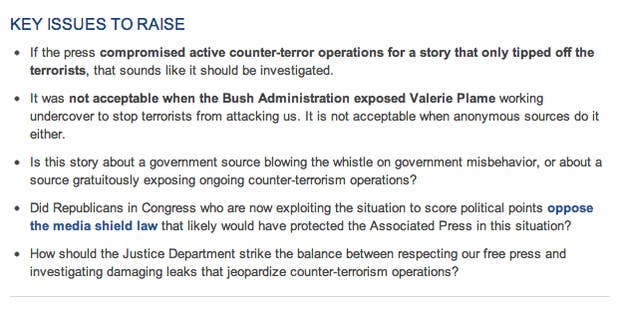
The chairman of the group Media Matters told BuzzFeed Wednesday that the group plans to split a project that develops talking points for progressive pundits into a new organization, and he acknowledged that a controversial memo released Wednesday was an error of style, if not, he said, of substance.
Media Matters, best known as the leading progressive critic and monitor of alleged conservative media sins, took a bipartisan pounding Wednesday after it posted a set of talking points that appeared to defend the Obama Administration's monitoring of Associated Press reporters' phone calls.

Media Matters helpfully distributes talking points to those who want to defend DOJ's attack on AP http://t.co/VddC4lpaHj

Glenn Greenwald
@ggreenwald
Media Matters helpfully distributes talking points to those who want to defend DOJ's attack on AP http://t.co/VddC4lpaHj
Media Matters posts talking points to defend DOJ spying on AP reporters: http://t.co/HbnliipQrQ

David Freddoso
@freddoso
Media Matters posts talking points to defend DOJ spying on AP reporters: http://t.co/HbnliipQrQ
And Media Matters' immediate defense brought a new round of ridicule: The group argued that the talking points were the product of the Media Matters Action Network, its sister group, which operates from the same Washington, D.C., office.
Whatever the talking points — produced under the "Message Matters" rubric — say, Media Matters is on the side of the AP, the group's founder and chairman David Brock told Erik Wemple.
"We stand with those news organizations and share their concerns," he said.
In an interview, Brock detailed the thought process behind the talking points, which he said went to an email list of some 3,000 "progressive talkers and influentials," part of a project to train and coach liberal talkers that began in 2011. (The talking points are posted a few times a week on a public website, but are not aimed at a general audience, he said.) He also said the Message Matters and Media Matters teams work separately — but acknowledged the basic tension between running a group that casts itself as a just-the-facts-ma'am ally of the unbiased press; and one that coaches progressive talking heads on making their case.
"We would not say it the way we said it by itself, if we had it to do over again," Brock said. "People did not understand what we were trying to do and why we were trying to do it."
Brock also said that, well before Wednesday's flap, he had begun circulating a proposal to spin off the Message Matters project.
"We've been aware, as this Message Matters product has grown and the audience for it, that there are potential issues raised for the Media Matters brand ... because that brand is not advocacy, is not talking points, it's entirely fact-based," he said. "We decided some time ago that the training and messaging project would become its own freestanding organization."
The split will come, he said, "very soon."
Brock also laid out the thinking behind the talking points, which, he said, were intended not to encourage spying on the press, but simply to make listeners receptive to progressive views on a sensitive national security topic.
The Message Matters project, he said, grew out of the Media Matters Action Network's attempt to "enhance progressie voices in the media and to ensure more balance in the debate and diversity in the debate." The project launched to train pundits, but expanded as the group found that "people who are trained want some guidance on what to say when they get booked."
Brock said the aim of Wednesday's talking points was to accomplish a goal of the training: "that progressives should not cede the ground of national security to the right wing."
"The piece is basically recommending that there should be some acknowledgement that there is a balance to be struck between freedom o fhte press and national security as a way into a conversation that is really focused on the potential of opportunistic republicans exploiting the situation," he said, pointing to a section of the document that accuses Republicans of hypocrisy.
The rhetorical move, he said, "is to acknowledge what most people believe — which is that there is a balance between the free press and national security," he said. The talking points are "used primarily for people on television who are talking to a broad audience — they're not talking specifically to progressives."
"If you are going to successful persuade them, there has to be some acknowledgement that this tension exists, that it's sensitive," he said. It's important, Brock said, "to be seen as balanced coming into the conversation."
The underlying theory, Brock said, "is that when your'e out there talking to a wide audience, there are things that one says or does to 'get in the circle,' the circle being mainstream America."
Brock added that the talking points are intended as "a range of messaging options" for a spectrum of talkers, not as "the 10 Commandments."
And he stressed that — even before the groups split — the teams are separate.
"The process of generating all our fact-check type material for Media Matters has nothign to do with the Message Matters content," Brock said.
